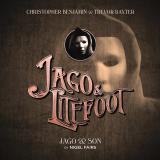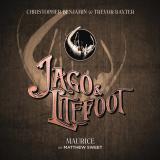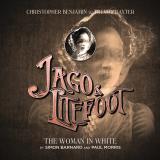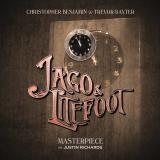
Stars: Alex Kingston (River Song), Colin Baker (The Sixth Doctor), Sylvester McCoy (The Seventh Doctor), Anna Maxwell Martin (Maddie Bower), Gemma Saunders (Ellen Byrne), Justin Avoth (Robert Murphy), Salome Haertel (Rachel), Jessie Buckley (Sarah Dean), Ann Bell (Lisa Burrows), Robert Pugh (Emmett Burrows), Dan Starkey (Computer), Aaron Neil (Steven Godbold), Sara Powell (The PA), Sam Alexander (Todd the Pod), Barnaby Edwards (Autocorrect), Paul Keating (Isaac George), Robert Hands (Daniel Defoe), Alan Cox (Robert Harley)
Written by Guy Adams, John Dorney, James Goss, Matt Fitton
Directed by Ken Bentley
Produced by David Richardson
Big Finish Productions, 2016
“Some days I dreamed of having two of you to play with – but not you two! You really shouldn’t have met!”
River Song to the Sixth and Seventh Doctors
Volume 1 of The Diary of River Song in 2016 was a good, if not brilliant, start to River Song’s adventures on audio. As this writer remarked in his review of that boxset, Alex Kingston could certainly hold her own in a River-centric series and the stories, as diverse as they were in terms of style and settings, showed there was great potential for ongoing adventures with the Doctor’s archaeologist wife.
Whereas Vol 1 contained two very good episodes and two very ‘so-so’ instalments, The Diary of River Song Vol 2 has three very strong scripts and one ‘so-so’ tale. This is already a significant improvement, you might say, on the first volume. Only two of the contributors from the first box set write for Vol 2 – James Goss and Matt Fitton while Guy Adams and John Dorney take up the writing duties from Jenny T Colgan and Justin Richards. Like Vol 1 (and also the recent adventures of Big Finish’s other resident archaeologist Professor Bernice Summerfield), the four tales, while distinct from each other in storytelling styles, form part of an overarching, epic narrative of quite ‘earthshattering’ dimensions (spoilers!). In Vol 1, there was a pay-off for the listener in the final instalment, as River encountered an earlier incarnation of her husband – the Eighth Doctor. In Vol 2, however, BF pulls out all the stops and pits River not only against temporal paradoxes, temporal zombies, and a horde of quantum squids and their malevolent queen, but two even earlier incarnations of her husband. While the linked storyline of Vol 2 is stronger than the ‘Rulers of the Universe’ sub-plot in Vol 1, it is debatable whether the inclusion of multiple Doctors is a strength or a weakness.
The Unknown, by Guy Adams, opens the box set in dramatic style. The Saturnius, an experimental starship, is despatched from Earth to investigate the arrival of a mysterious planet on the edge of the solar system. River is, without any real explanation given in the narrative, amongst the tiny four-person crew to investigate the phenomenon. In the bargain, a pint-sized stranger with a Scots accent is also apprehended and detained in the brig. He seems to know what is happening to the structural integrity of the ship as it nears the planet and although River doesn’t automatically recognise him, he seems oddly familiar …
The Unknown is almost a virtual retelling of the Doctor Who TV episode Journey to the Centre of the TARDIS, complete with its own variation of temporal zombies and the ‘get out of jail’ card at the conclusion (which is a pet hate of this writer!). However, the story’s strongest influences seem to be from Star Trek’s past incarnations – from the Federation-style starship to the captain’s Picard-like order for black coffee to the Irish-accented, testy chief engineer to the smug computer (voiced by BF regular Dan Starkey) to the staple temporal quandary that plagues the starship, and its inevitable reset at the conclusion (again a pet hate!), you’d be forgiven for thinking River and the Seventh Doctor (Sylvester McCoy) had stepped into a generic Star Trek episode. It’s difficult to know if Adams is homaging or lampooning Trek (possibly the latter more than the former), although there’s scarcely a red shirt in sight …
 That’s not to say the serial itself isn’t entertaining in parts (there is some very clever dialogue) or that the performers don’t do first class jobs (especially as they all play characters suffering from amnesia induced by the starship’s temporal distortions). However, given this style of tale has been done in Doctor Who before (fortunately on TV just the once, but a couple of times now by Big Finish) – and indeed was often done to death in Trek – it comes across as clichéd, tedious and ordinary. This makes The Unknown (itself a feeble title) the weakest of the four episodes.
That’s not to say the serial itself isn’t entertaining in parts (there is some very clever dialogue) or that the performers don’t do first class jobs (especially as they all play characters suffering from amnesia induced by the starship’s temporal distortions). However, given this style of tale has been done in Doctor Who before (fortunately on TV just the once, but a couple of times now by Big Finish) – and indeed was often done to death in Trek – it comes across as clichéd, tedious and ordinary. This makes The Unknown (itself a feeble title) the weakest of the four episodes.
John Dorney’s Five Twenty-Nine is a very different change of pace from the temporal hi-jinks of The Unknown and of the subsequent tales, and the highlight of the set. Having established the identity of the planet that the Saturnius was investigating, River travels back to the source of the time/space fluctuations that have engulfed it. The ensuing story is very much, in Dorney’s own words, a ‘quiet apocalypse’ piece, bearing some resemblance to another fan favourite telefantasy program in Survivors.
It is also a reflective, personal story, as River meets an elderly couple and their android ‘daughter’ Rachel (played by Alex Kingston’s own daughter Salome Haertel). Dorney shows why he is one of the best contributors to the BF range – he knows how to write stories that, while a little slow-moving in pace, are intimate, moving, persuasive and emotional. His characters are also very three-dimensional and sympathetic; both Emmett and Lisa Burrows (Robert Pugh and Ann Bell respectively) are very salt of the earth characters, practical and unpretentious while Steven Goldbold (Aaron Neil) is full of the controlled bravado which doubles for intensity and anxiety deep under the skin. They are all bewildered by the ‘event’ that consumes their world but they, along with the synthetic Rachel, are prepared to meet their fates with dignity and courage rather than abject terror.
World Enough and Time is, by comparison to Five Twenty-Nine, high farce. Indeed, writer James Goss takes many cues from the late Douglas Adams (not terribly surprising given Goss has in recent years novelised two of Adams’s classic Doctor Who serials The Pirate Planet and City of Death). River ends up working as a temp for an intergalactic corporation called Golden Futures, which trades off the back of dreamers in suspended animation. It’s no real surprise that with a 'too good to be true' name like Golden Futures, the company is a front for something incredibly nasty and ghastly. However, not only does River stumble upon a grand plan to replace the Earth with an imperfect copy (a feat of pan-dimensional engineering that no doubt Adams’ Slartibartfast would be incredibly proud of!) but is startled to learn that the Sixth Doctor (Colin Baker) is the CEO of Golden Futures by default after he bought a 51 per cent stake in the company. The problem is River cannot decide if the Doctor has been duped – thanks to the monotonous office politics, staff bureaucracy and human resources nonsense that seems to have swamped his new executive role (office life is very well satirised in the serial) – or if he is indeed truly aware of what is going on and simply doesn’t care …
The Eye of the Storm concludes the set as River and the the Sixth and the Seventh Doctors all come together – working at cross-purposes to the other in 18th century London. Matt Fitton’s script also throws in alien monsters, novelist Daniel Dafoe (of Robinson Cruesoe and Moll Flanders fame), the infamous Newgate Prison, the UK’s Great Storm of November 1703 and two star-crossed lovers. Remarkably it all coalesces beautifully, with River playing a substantial role in the denouement which is intimate and tragic. Like Dorney, Fitton also has a talent for showing the impact that grand events can have on a small-scale – in this instance, that a modest, innocent romance can influence the future direction of an entire world.
 The chemistry between Alex Kingston and Colin Baker in the final two instalments is wonderfully cheeky and mischievous, as the Sixth Doctor encounters a character that is intellectually his equal and just as brash and impulsive as he is. Anyone who still hasn’t got over the original kiss between the Doctor and his companion more than two decades ago in the 1996 TV movie will be equally bamboozled to learn that perhaps it didn’t all start with the Eighth Doctor’s Byronic demeanour after all. It may in fact have been the much maligned Sixth Doctor, with a little prompting from River, who started that ball rolling …
The chemistry between Alex Kingston and Colin Baker in the final two instalments is wonderfully cheeky and mischievous, as the Sixth Doctor encounters a character that is intellectually his equal and just as brash and impulsive as he is. Anyone who still hasn’t got over the original kiss between the Doctor and his companion more than two decades ago in the 1996 TV movie will be equally bamboozled to learn that perhaps it didn’t all start with the Eighth Doctor’s Byronic demeanour after all. It may in fact have been the much maligned Sixth Doctor, with a little prompting from River, who started that ball rolling …
River’s flirtation with the even more unfashionable Seventh Doctor is also memorable in the closing moments of the final episode. Both Kingston and McCoy are flawless in their execution of a scene in which River seeks to outflank the crafty, manipulative Seventh Doctor. It is both amusing and compelling – as the two Time Lords flirtatiously engage in a battle of wills. “Oh, you frustrating, gorgeous little man!” River exclaims before knocking him unconscious with a Ming vase!
Although the two Doctors are generally kept separate for much of the duration of Eye of the Storm (and indeed for three-quarters of the box set as a whole), when they do come together, Colin Baker and Sylvester McCoy are excellent. Their witty and disrespectful repartee is highly reminiscent of Patrick Troughton and Jon Pertwee’s double act in The Three Doctors, and it’s clear Baker and McCoy inject a little bit of the faux rivalry they demonstrate at conventions into their Doctors’ characterisations (in the CD extras, McCoy even recalls how Baker continually teases that none of the actors that came after him are truly the Doctor because he never had a regeneration scene on TV!). “It’s always about the grand futile gestures with you, isn’t it?” the Seventh Doctor contemptuously shouts at the Sixth Doctor, disapproving of the latter’s compassion, selflessness and even heroism in dangerous situations, while the Sixth Doctor informs the “big bad” of the final instalment of the futility of feasting on his successor – “You don’t want to bother with him – rather stringy and very bitter, I imagine!”
As much as the interaction between River and the two Doctors is a highlight and strength of this box set, my biggest criticism is that it is also a weakness. With the exception of one story, River has to share the action with not just one, but two Doctors. While her husbands’ presence doesn’t diminish River’s feisty qualities and leadership characteristics or affect Alex Kingston’s magnificent performance, I really question the value of River having her own series when it seems nearly every second story will be gatecrashed in some fashion by one (or more) of the Doctor’s incarnations.
 Instead, what we mostly get from this set is the usual style of storytelling faire that you’d expect from Big Finish’s regular Doctor Who releases or The Doom Coalition saga, in which River Song also appears. The Husbands of River Song strongly hinted that River was a con artist, rogue archaeologist and adventurer – a female Han Solo/Indiana Jones cross, if you will. Sadly, none of that characterisation is utilised in this box set, and therefore a fantastic opportunity to differentiate River’s solo adventures from the Doctor’s goes wasted.
Instead, what we mostly get from this set is the usual style of storytelling faire that you’d expect from Big Finish’s regular Doctor Who releases or The Doom Coalition saga, in which River Song also appears. The Husbands of River Song strongly hinted that River was a con artist, rogue archaeologist and adventurer – a female Han Solo/Indiana Jones cross, if you will. Sadly, none of that characterisation is utilised in this box set, and therefore a fantastic opportunity to differentiate River’s solo adventures from the Doctor’s goes wasted.
The only real point of difference, in fact, that we have between River and the Doctor in this set is that (a) she is more prepared to use a weapon to kill, if necessary (much to the Seventh Doctor’s extreme disapproval), (b) that she can be ruthless in her management of antagonists, particularly if the Doctor’s life is at risk (as demonstrated in the climactic moments of World Enough and Time) and (c) she will act as the Doctor’s conscience in the event that he cannot (as occurs in The Eye of the Storm).
The Diary of River Song Vol 2 is, from a writing and production standpoint, a better box set than Vol 1. As usual, Big Finish’s sound quality and production values are excellent, and even with larger than life figures like Kingston, Baker and McCoy dominating proceedings, there are some excellent performances from the supporting actors such as the aforementioned Haertel, Bell and Pugh, Sara Powell as Golden Futures’ villainous personal assistant to the managing director (or MDPA), and Jessie Buckley and Paul Keating as star-crossed lovers Sarah and Isaac. Nevertheless, like Vol 1, there is great potential for ongoing adventures but it would be ideal if the next volume is more, dare I say it, 'adventurous' and leaves the Doctor out of the proceedings.
Now that Alex Kingston has worked with Paul McGann, Sylvester McCoy and Colin Baker, surely it must be tempting for the BF crew to try to extend that company to Tom Baker and Peter Davison. I would prefer that temptation is ignored and the third box is full of more refreshing, innovative and original ideas. Perhaps there’s even scope for the android Rachel to become a companion to River – based on Salome Haertel's encouraging performance. And even if the next couple of volumes insist on still drawing on Doctor Who’s rich history, there are plenty of other characters and concepts that could be explored without directly involving the Doctor. After all, what did River do to the Daleks at some point that had one begging her for mercy back in The Big Bang?
 That’s not to say the serial itself isn’t entertaining in parts (there is some very clever dialogue) or that the performers don’t do first class jobs (especially as they all play characters suffering from amnesia induced by the starship’s temporal distortions). However, given this style of tale has been done in Doctor Who before (fortunately on TV just the once, but a couple of times now by Big Finish) – and indeed was often done to death in Trek – it comes across as clichéd, tedious and ordinary. This makes The Unknown (itself a feeble title) the weakest of the four episodes.
That’s not to say the serial itself isn’t entertaining in parts (there is some very clever dialogue) or that the performers don’t do first class jobs (especially as they all play characters suffering from amnesia induced by the starship’s temporal distortions). However, given this style of tale has been done in Doctor Who before (fortunately on TV just the once, but a couple of times now by Big Finish) – and indeed was often done to death in Trek – it comes across as clichéd, tedious and ordinary. This makes The Unknown (itself a feeble title) the weakest of the four episodes.
 The chemistry between Alex Kingston and Colin Baker in the final two instalments is wonderfully cheeky and mischievous, as the Sixth Doctor encounters a character that is intellectually his equal and just as brash and impulsive as he is. Anyone who still hasn’t got over the original kiss between the Doctor and his companion more than two decades ago in the 1996 TV movie will be equally bamboozled to learn that perhaps it didn’t all start with the Eighth Doctor’s Byronic demeanour after all. It may in fact have been the much maligned Sixth Doctor, with a little prompting from River, who started that ball rolling …
The chemistry between Alex Kingston and Colin Baker in the final two instalments is wonderfully cheeky and mischievous, as the Sixth Doctor encounters a character that is intellectually his equal and just as brash and impulsive as he is. Anyone who still hasn’t got over the original kiss between the Doctor and his companion more than two decades ago in the 1996 TV movie will be equally bamboozled to learn that perhaps it didn’t all start with the Eighth Doctor’s Byronic demeanour after all. It may in fact have been the much maligned Sixth Doctor, with a little prompting from River, who started that ball rolling … Instead, what we mostly get from this set is the usual style of storytelling faire that you’d expect from Big Finish’s regular Doctor Who releases or The Doom Coalition saga, in which River Song also appears. The Husbands of River Song strongly hinted that River was a con artist, rogue archaeologist and adventurer – a female Han Solo/Indiana Jones cross, if you will. Sadly, none of that characterisation is utilised in this box set, and therefore a fantastic opportunity to differentiate River’s solo adventures from the Doctor’s goes wasted.
Instead, what we mostly get from this set is the usual style of storytelling faire that you’d expect from Big Finish’s regular Doctor Who releases or The Doom Coalition saga, in which River Song also appears. The Husbands of River Song strongly hinted that River was a con artist, rogue archaeologist and adventurer – a female Han Solo/Indiana Jones cross, if you will. Sadly, none of that characterisation is utilised in this box set, and therefore a fantastic opportunity to differentiate River’s solo adventures from the Doctor’s goes wasted.

 The villains in the opener Jago & Son are of an earthlier disposition than the Master, although their divine purpose is indeed based in the extra-terrestrial. Nevertheless, their incompetence would easily disappoint the evil Time Lord! In all, Nigel Fairs’ opener is farce from start to finish as Jago (Christopher Benjamin) encounters a mysterious young man who claims to be Henry Gordon Jago Junior (even though Mr J swears until he’s blue in the face in his own profligate, baroque Victorian lingo that he doesn’t have any offspring). Meanwhile, Professor Litefoot (Trevor Baxter) has caught up with an old flame in archaeologist Professor Jean Bazemore (the wonderfully pompous Rowena Cooper). Prof Bazemore has returned to the British Isles after years away unearthing ancient Egyptian tombs to uncover something infinitely older in London’s catacombs. Jean’s strong anti-establishment character is the opposite of the reserved and chivalrous Litefoot yet they gel brilliantly, even if the former’s more masculine demeanour blindsides both Jago and Inspector Quick (Conrad Asquith). Indeed, there are a few LGBT jokes and references that go over the heads of the Victorian characters but will leave a smile on the faces of 21st century listeners!
The villains in the opener Jago & Son are of an earthlier disposition than the Master, although their divine purpose is indeed based in the extra-terrestrial. Nevertheless, their incompetence would easily disappoint the evil Time Lord! In all, Nigel Fairs’ opener is farce from start to finish as Jago (Christopher Benjamin) encounters a mysterious young man who claims to be Henry Gordon Jago Junior (even though Mr J swears until he’s blue in the face in his own profligate, baroque Victorian lingo that he doesn’t have any offspring). Meanwhile, Professor Litefoot (Trevor Baxter) has caught up with an old flame in archaeologist Professor Jean Bazemore (the wonderfully pompous Rowena Cooper). Prof Bazemore has returned to the British Isles after years away unearthing ancient Egyptian tombs to uncover something infinitely older in London’s catacombs. Jean’s strong anti-establishment character is the opposite of the reserved and chivalrous Litefoot yet they gel brilliantly, even if the former’s more masculine demeanour blindsides both Jago and Inspector Quick (Conrad Asquith). Indeed, there are a few LGBT jokes and references that go over the heads of the Victorian characters but will leave a smile on the faces of 21st century listeners! The second instalment Maurice, written by Matthew Sweet, is a very different “beast” in tone and pace to Jago & Son. The story focuses on French composer, pianist and conductor Maurice Ravel (1875-1937), better known for his composition Boléro, but set some 30 years before that famous piece. Indeed, the musical work that the young Ravel (played by Andy McKeane) works on in this tale - Gaspard de la nuit, which was inspired by the book by French author Aloysius Bertrand, and which premiered in Paris in 1909 – plays a pivotal role in the story. Litefoot finds himself thrust into a macabre fantasy world in which many strange elements of Ravel’s composition seemingly come to life. McKeane impresses as Ravel and the villain, even though his hackneyed French accent can sometimes grate on the listener.
The second instalment Maurice, written by Matthew Sweet, is a very different “beast” in tone and pace to Jago & Son. The story focuses on French composer, pianist and conductor Maurice Ravel (1875-1937), better known for his composition Boléro, but set some 30 years before that famous piece. Indeed, the musical work that the young Ravel (played by Andy McKeane) works on in this tale - Gaspard de la nuit, which was inspired by the book by French author Aloysius Bertrand, and which premiered in Paris in 1909 – plays a pivotal role in the story. Litefoot finds himself thrust into a macabre fantasy world in which many strange elements of Ravel’s composition seemingly come to life. McKeane impresses as Ravel and the villain, even though his hackneyed French accent can sometimes grate on the listener. We meet two more historical figures in Simon Barnard and Paul Morris’s The Woman in White – the 19th century Shakespearean thespian Sir Henry Irving (played by one-time Doctor Who guest star Edward de Souza) and Irving’s theatre manager Bram Stoker (Jonathan Forbes), the future author of Dracula. Aside from borrowing elements very heavily from Stoker’s famous novel and what is known of the Irving/Stoker partnership, Barnard and Morris’s titular character is also clearly influenced by the 2011 Doctor Who episode The Curse of the Black Spot. De Souza is wonderfully over the top as the intolerant, bewildered Irving while Forbes brings the right level of naivety to the fresh-faced, inexperienced yet effusive Stoker. Special mention should also go to BF alumni Robbie Stevens who again displays versatility as the villainous Mr Manners (Stevens previously impressed as both a crusty British MP and a union shop steward in 2015’s We are the Daleks).
We meet two more historical figures in Simon Barnard and Paul Morris’s The Woman in White – the 19th century Shakespearean thespian Sir Henry Irving (played by one-time Doctor Who guest star Edward de Souza) and Irving’s theatre manager Bram Stoker (Jonathan Forbes), the future author of Dracula. Aside from borrowing elements very heavily from Stoker’s famous novel and what is known of the Irving/Stoker partnership, Barnard and Morris’s titular character is also clearly influenced by the 2011 Doctor Who episode The Curse of the Black Spot. De Souza is wonderfully over the top as the intolerant, bewildered Irving while Forbes brings the right level of naivety to the fresh-faced, inexperienced yet effusive Stoker. Special mention should also go to BF alumni Robbie Stevens who again displays versatility as the villainous Mr Manners (Stevens previously impressed as both a crusty British MP and a union shop steward in 2015’s We are the Daleks). The final instalment Masterpiece brings the investigative duo and publican Ellie (Lisa Bowerman) face to face with the Master himself, played throughout this box set by stalwart Geoffrey Beevers. Beevers’ silky tones, dripping with delicious mischief and menace (butter certainly doesn’t melt in this Time Lord’s mouth!), reinforce why his version of the Master is ideally suited to audio. It’s just a pity that the so-called “masterpiece” of the story is quite underwhelming. Admittedly the Master is in a weakened state (it is very clear by the climax exactly when in the Master’s timeline Masterpiece occurs) but even he would agree that it’s a pretty unambitious plot by his standards. Perhaps the blame should be levelled not so much at the Master as the writer in Justin Richards. Richards seems to have a penchant for delivering “by the numbers” stories that are quite dull, slow-moving and relatively undramatic (his concluding piece for the last series of the Blake’s 7 audio adventures was equally uninspiring, as was his contribution to The Diary of River Song Vol 1). Masterpiece sadly falls into that criteria. Perhaps it’s because Richards is often busy with other projects beyond BF but if that’s the case, then it’s even more reason for him to take a step back and let someone with fresh ideas take on the writing duties.
The final instalment Masterpiece brings the investigative duo and publican Ellie (Lisa Bowerman) face to face with the Master himself, played throughout this box set by stalwart Geoffrey Beevers. Beevers’ silky tones, dripping with delicious mischief and menace (butter certainly doesn’t melt in this Time Lord’s mouth!), reinforce why his version of the Master is ideally suited to audio. It’s just a pity that the so-called “masterpiece” of the story is quite underwhelming. Admittedly the Master is in a weakened state (it is very clear by the climax exactly when in the Master’s timeline Masterpiece occurs) but even he would agree that it’s a pretty unambitious plot by his standards. Perhaps the blame should be levelled not so much at the Master as the writer in Justin Richards. Richards seems to have a penchant for delivering “by the numbers” stories that are quite dull, slow-moving and relatively undramatic (his concluding piece for the last series of the Blake’s 7 audio adventures was equally uninspiring, as was his contribution to The Diary of River Song Vol 1). Masterpiece sadly falls into that criteria. Perhaps it’s because Richards is often busy with other projects beyond BF but if that’s the case, then it’s even more reason for him to take a step back and let someone with fresh ideas take on the writing duties.








